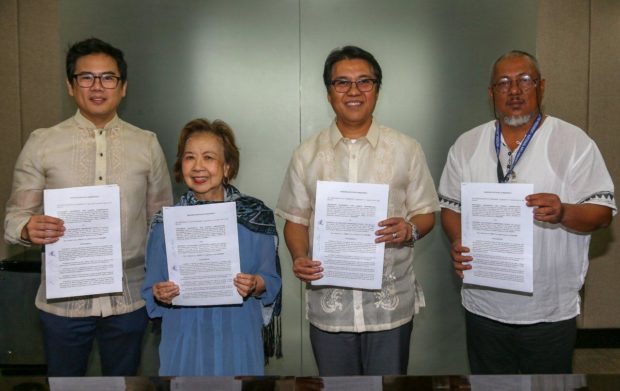
(From left) PAGCOR Vice President for Corporate Social Responsibility Group Jimmy Bondoc, Pagcor Director Carmen Pedrosa, NAPC Secretary Atty. Noel Felongco and NAPC Head Executive Assistant and Chief of Staff Elias Labro Jr. show the signed memorandum of agreement between the two agencies. (PHOTO FROM: Pagcor)
MANILA, Philippines—The government’s casino regulating agency has given the green light for the use by the National Anti-Poverty Commission (NAPC) of at least P48 million that remained from a P50 million grant awarded to the commission in 2017.
In a statement, the NAPC said the Philippine Amusement and Gaming Corp. (Pagcor) allowed the use of the funds under a new memorandum of agreement (MOA) signed by Pagcor and NAPC recently.
The fund was initially turned over by Pagcor to the NAPC in July 2017 but the use of the money was suspended after projects earmarked for funding by the grant “did not materialize” within the two-year period set by the first MOA between the two agencies.
Lawyer Noel Felongco, NAPC chief, said the fund would help in the commission’s poverty-reduction programs like the “Poverty Reduction through Rural Development: Sambayanihan Serbisyong Sambayanan (3S) Prototype Projects”.
“I am very grateful for Pagcor’s support and for trusting NAPC,” said Felongco.
“This is a very big opportunity,” he said. “We all know that the budget of NAPC is small and this Pagcor grant is a very valuable help for the agency’s poverty-reduction activities nationwide,” Felongco added.
The 3S Prototype is a five-year development plan of NAPC from 2019 to 2023 which seeks to “provide a climate-responsive, culture and gender-sensitive, and convergent and participatory anti-poverty strategy in line with the administration’s poverty reduction target.” It was not clear why the program exceeded President Rodrigo Duterte’s term by one year.
Felongco said that the prototype projects also cover poverty-stricken sectors like agriculture and fishing with farmers and fishermen getting training and help in marketing their produce.
“We will connect our producers directly to the consumers,” Felongco said.
“These are among the pilot projects which will be funded by Pagcor,” he said.
According to Felongco, although NAPC was not “an implementing agency, we can show to our legislators and Executive office that such pilot projects are effective, hence, funding for these pilot projects should be continued.”
Citing data from the Philippine Statistics Authority (PSA), the NAPC said that the country’s poverty incidence slipped from 26.3 percent in the first semester of 2015 to 21 percent in the first semester of 2018.
In its first quarter survey in 2019, the Social Weather Stations said at least 9.5 percent, or 2.3 million Filipino families, experienced “involuntary hunger” at least once in the last three months counted by the survey conducted from March 28 to 31, 2019.
Also in its 2019 first quarter survey, SWS said the number of families who considered themselves as poor fell to a record low of 38 percent, or 9.5 million families./TSB